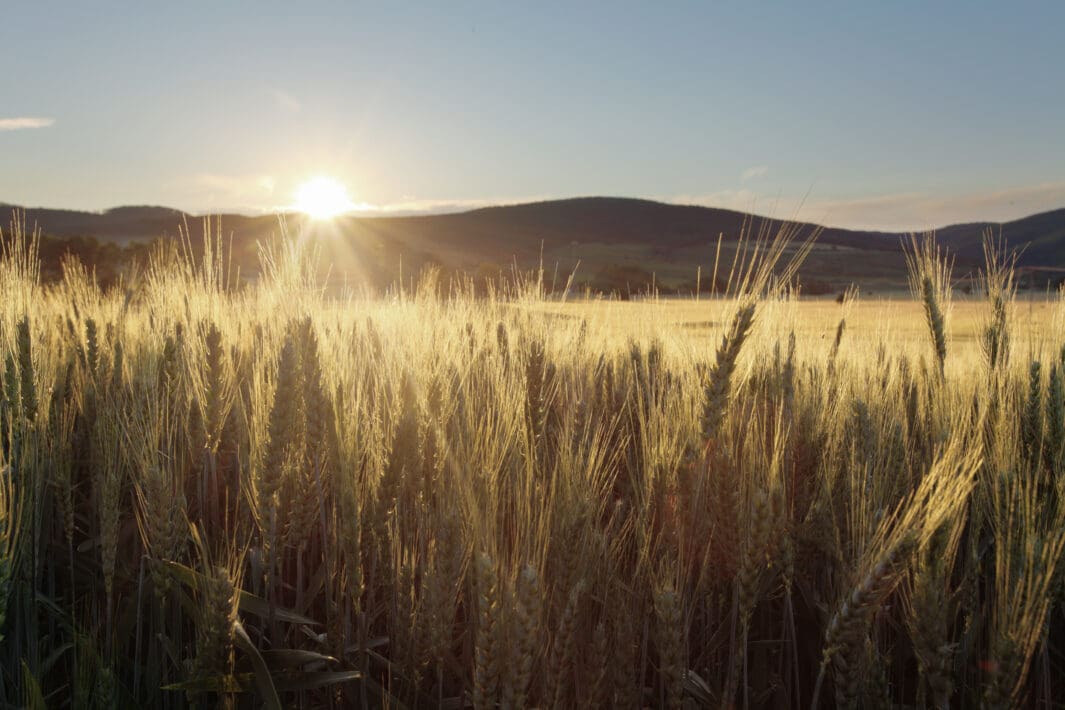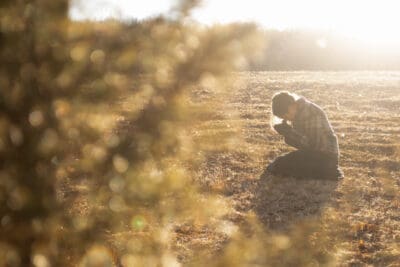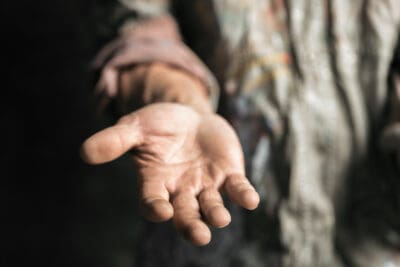
See God’s sovereign plan unfold as tragedy and loss pave the way for a life-changing crossroads where Ruth decides to follow Naomi and her God out of Moab to Bethlehem.
These are only preliminary, unedited outlines and may differ from Andy’s final message.
The Book of Ruth appears at first glance to be a charming little love story set in an ancient time. But it is so much more than that!
Whenever we come to any book of the Bible, it is valuable to ask, “Why did God want this book to be in the Bible? What was the purpose of the Holy Spirit in inspiring its words, and preserving it through centuries so that every generation of Christians could read it and take its timeless lessons to heart?”
In order to answer that question, then, we need to see beyond the immediate narrative to look deeper—yes, it is the story of how a woman named Ruth met her husband Boaz, was married to him, and started a family. It has a far greater significance than that.
For the fourth chapter of Ruth reveals that Boaz and Ruth were the parents of Obed, who was the father of Jesse, who was then the father of David… the greatest king Israel ever had. So all the Jewish nation in the centuries that followed the glories of King David’s reign would pass on this charming little bit of family heritage as a part of their national story. But we Christians can take it much further than that… for David was the ancestor of Jesus, the Savior, the King of the Universe. A far greater king than David ever was. So this is the story of how the father of the true King of the Kingdom of Heaven was eventually born… the human ancestry of Jesus Christ comes through Ruth and Boaz.
Along with that, we will also learn valuable lessons on God’s redemptive plan for the Gentiles, and God’s plan for the Christian family as well. For Ruth was a Gentile woman—a Moabitess. We’ll talk about that. And Boaz’s mother was Rahab the harlot, rescued from the rubble of Jericho—destroyed by the hand of God as Joshua began Israel’s conquest of the Promised Land. God wove two Gentile woman of a notorious past into the family tree of Jesus Christ. So we will touch on those exalted themes.
But as I said, we will also talk about God’s plan for the Christian family in the paradigm example of Boaz as a godly man, husband, and father… and Ruth as a godly woman, wife, and mother. In this story of Ruth, we see the concept of patriarchy in full flower… radiantly beautiful. That word, “patriarchy” (which means the authority of fathers), has become hated in our modern world. Without a doubt, the hatred of the rule of fathers has come in part from the wickedness of many fathers whose sins oppressed their wives and children ruthlessly. But just as the concept of kingship is not ruined by the countless tyrants who have reigned through the ages such that Jesus is not ashamed to be called “King,” so the concept of patriarchy is not ruined by oppressive or abusive husbands and fathers… so we have a picture of how a godly man can use is strength and leadership to establish a beautiful shelter—protection and provision—under which a woman can flourish as a wife and mother. Boaz… the paradigm of a patriarch, and Ruth, the paradigm of a godly woman flourishing under the man’s loving and gentle protection.
So here we go…
- The Context of the Book of Ruth: Israel Had No King
The book of Ruth begins with this historical setting:
Ruth 1:1 In the days when the judges ruled
This immediately follows the end of the worst book in the Bible… the Book of Judges… which concluded with these words
Judges 21:25 In those days Israel had no king. Everyone did what was right in his own eyes.
Judges was a time of spiritual anarchy… in which the Levites failed miserably to teach the Jewish nation the laws of God or God’s mighty works of deliverance that was their national spiritual heritage:
Judges 2:10-11 After that whole generation had been gathered to their fathers, another generation grew up, who knew neither the LORD nor what he had done for Israel. 11 Then the Israelites did evil in the eyes of the LORD and served the Baals.
This began a miserable cycle of national rebellion, leading to judgments from God (which generally included Gentile nations invading the Promised Land and stealing, killing and destroying the Jewish prosperity… then they would cry out to God for deliverance and God would send a judge who would deliver Israel militarily.
But the nation was consistently spiritually adrift, lawless, unaware of the Laws of Moses. Four times in the Book of Judges, we are told “In those days, Israel had no king…” Three of those times, it follows with these words, “Everyone did what was right in his own eyes.”
The lack of a king in Israel meant spiritual lawlessness, as well as corresponding judgments by God.
The Book of Ruth starts with just such a judgment:
Ruth 1:1-2 In the days when the judges ruled, there was a famine in the land, and a man from Bethlehem in Judah, together with his wife and two sons, went to live for a while in the country of Moab. 2 The man’s name was Elimelech, his wife’s name Naomi, and the names of his two sons were Mahlon and Kilion. They were Ephrathites from Bethlehem, Judah. And they went to Moab and lived there.
Famine in the land is one of the judgments God threatened in the Laws of Moses if they failed to obey him
Deuteronomy 28:23-24 The sky over your head will be bronze, the ground beneath you iron. 24 The LORD will turn the rain of your country into dust and powder; it will come down from the skies until you are destroyed.
- Elimelech’s Faithless Decision
- During this Famine, a Man Made a Faithless Decision
- Elimelech… from the tribe of Judah… gave up on the Promised Land
- He chose to take his wife and two sons to Moab to find food
Ruth 1:1-2 In the days when the judges ruled, there was a famine in the land, and a man from Bethlehem in Judah, together with his wife and two sons, went to live for a while in the country of Moab. 2 The man’s name was Elimelech, his wife’s name Naomi, and the names of his two sons were Mahlon and Kilion. They were Ephrathites from Bethlehem, Judah. And they went to Moab and lived there.
- Moab
- These were among the enemies of Israel
- A pagan people, whose origin is from the incestuous relationship between Lot and one of his daughters in the cave outside Sodom and Gomorrah
- The Moabites strongly opposed Israel during their time of wondering the desert, even hiring Balaam to curse them and then enticing them with sexually alluring women
- They ruled over Israel for 18 years during the time of Eglon their king (Judges 3)
- They were deeply wicked spiritually, following their detestable god Chemosh
- Moabite women were consistently a snare to godly Jewish men, including Solomon, who followed their allegiance to Chemosh, including child sacrifice (2 Kings 3)
- So for Elimelech to forsake Bethlehem and go to Moab for food was to miss the whole point of the Lord’s discipline
- Keep in mind, most of the residents of Bethlehem stayed their and sought to survive… they were waiting for Naomi when she came back years later
- What made Elimelech’s decision so terrible was that his name mean “My God is king!” and he wasn’t acting in faith… and he was leading his sons into temptation, for they were not yet married
- Furthermore, Bethlehem means “house of bread”… he should have trusted in God to renew that name, waiting on the Lord and turning to him in repentance, fasting, and prayer
- Elimelech’s Family
- Naomi, his wife… her name means “Pleasant”
- Two sons… Mahlon and Kilion… seeking wives;
- But now, they can only find Moabite women!
- Tragedy Strikes
Ruth 1:3-5 Now Elimelech, Naomi’s husband, died, and she was left with her two sons. 4 They married Moabite women, one named Orpah and the other Ruth. After they had lived there about ten years, 5 both Mahlon and Kilion also died, and Naomi was left without her two sons and her husband.
- Naomi is left without protection
- In those days, a widow is singled out for sympathy because her protection is stripped away
- The answer is usually SONS… and she had two
- But then, they are stripped away also
- Naomi is a picture of a defenseless woman with no man to protect her and provide for her
- YET… Naomi will be the hub of the wheel of this story going forward… her connections and her counsel will be essential to what is about to transpire… the story keeps coming back to her
- Moabite Daughters-In- Law
- Orpah
- Ruth
- The Lord’s Provision and Naomi’s Decision
Ruth 1:6-7 When she heard in Moab that the LORD had come to the aid of his people by providing food for them, Naomi and her daughters-in-law prepared to return home from there. 7 With her two daughters-in-law she left the place where she had been living and set out on the road that would take them back to the land of Judah.
- The Lord Came to the Aid of His People
- The renewing of the harvest was no accident
- God was done chastising his nation for their sins and was now seeking to bless them with food
- Naomi never forgot about her true home, Bethlehem… the “house of bread”; she was aware of what was happening there
- God has chosen to renew Bethlehem’s name and provide bread again for them
- She Decides to Return to Israel
- Initially Her Daughters-In-Law make preparations for the journey as well
- The Eternal Fork in the Road
Ruth 1:8-14 Then Naomi said to her two daughters-in-law, “Go back, each of you, to your mother’s home. May the LORD show kindness to you, as you have shown to your dead and to me. 9 May the LORD grant that each of you will find rest in the home of another husband.” Then she kissed them and they wept aloud 10 and said to her, “We will go back with you to your people.” 11 But Naomi said, “Return home, my daughters. Why would you come with me? Am I going to have any more sons, who could become your husbands? 12 Return home, my daughters; I am too old to have another husband. Even if I thought there was still hope for me– even if I had a husband tonight and then gave birth to sons– 13 would you wait until they grew up? Would you remain unmarried for them? No, my daughters. It is more bitter for me than for you, because the LORD’s hand has gone out against me!” 14 At this they wept again. Then Orpah kissed her mother-in-law good-by, but Ruth clung to her.
- Naomi Is Calling on her Daughters-in-law to COUNT THE COST
- She wants them to realize what the road ahead looks like
- She wants them to see what the future holds in Israel
- Like Jesus with his disciples…
Luke 9:57-58 As they were walking along the road, a man said to him, “I will follow you wherever you go.” 58 Jesus replied, “Foxes have holes and birds of the air have nests, but the Son of Man has no place to lay his head.”
- Their Prospects Look Dim
- Also… this is the GLOOMY outlook that generally has descended on Naomi… she is depressed about her future
- BUT Putting these Women at the Fork in the Road is the context for one of the great moments in redemptive history
- Orpah made her decision, and said goodbye to her mother-in-law and to God
- Ruth’s Eternally Beautiful Declaration
Ruth 1:15-17 “Look,” said Naomi, “your sister-in-law is going back to her people and her gods. Go back with her.” 16 But Ruth replied, “Don’t urge me to leave you or to turn back from you. Where you go I will go, and where you stay I will stay. Your people will be my people and your God my God. 17 Where you die I will die, and there I will be buried. May the LORD deal with me, be it ever so severely, if anything but death separates you and me.”
- This Statement Flowed from Faith
- By faith, Ruth chose Naomi’s God to be her own… for the rest of her life
- Behind the scenes… I give some human credit to Naomi for the relationship she built with Ruth
- Ruth clearly loved and trusted her… for the rest of the narrative, Ruth will seek and will follow Naomi’s counsel… and include her in her life
- Ruth is also a forerunner of the countless millions of Gentile women and men who will be heaven because they would make an even clearer and better declaration of faith toward Jesus Christ
Revelation 7:9-10 After this I looked and there before me was a great multitude that no one could count, from every nation, tribe, people and language, standing before the throne and in front of the Lamb. They were wearing white robes and were holding palm branches in their hands. 10 And they cried out in a loud voice: “Salvation belongs to our God, who sits on the throne, and to the Lamb.”
- Naomi Accepted Ruth’s firm decision
Ruth 1:18 When Naomi realized that Ruth was determined to go with her, she stopped urging her.
- Naomi’s Gloomy Return to the Land of Blessing
Ruth 1:19-22 So the two women went on until they came to Bethlehem. When they arrived in Bethlehem, the whole town was stirred because of them, and the women exclaimed, “Can this be Naomi?” 20 “Don’t call me Naomi,” she told them. “Call me Mara, because the Almighty has made my life very bitter. 21 I went away full, but the LORD has brought me back empty. Why call me Naomi? The LORD has afflicted me; the Almighty has brought misfortune upon me.” 22 ¶ So Naomi returned from Moab accompanied by Ruth the Moabitess, her daughter-in-law, arriving in Bethlehem as the barley harvest was beginning.
- Naomi was stilled remembered by the women of Bethlehem
- Her relations will be essential to the story as it unfolds
- Her demeanor is decidedly pessimistic… though it’s hard to blame her
- “Don’t call me Naomi”… Naomi means “Pleasant”
- “Call me Mara”… Mara means “Bitter”
- “The Almighty has made my life very bitter”
- The essence of suffering well… don’t ever charge God with wrongdoing
- Obviously the trial is a great one… the loss of a husband and two sons
- “The Lord has reached out, the Lord has afflicted me… the Lord has struck me”
- But God was at work
- Beautiful Foreshadowing of the Blessing About to Come
Ruth 1:22 So Naomi returned from Moab accompanied by Ruth the Moabitess, her daughter-in-law, arriving in Bethlehem as the barley harvest was beginning.
- Ruth… a gift of God
- Barley… a symbol of God’s provision
- God was moving, God was working, God was about to pour out blessing even in the darkest time
- Lessons
- When in a time of discipline… humble yourself and trust God… don’t flee to the land of unbelief
- Stand in awe of God’s secret workings in ordinary events… who could ever see in that discussion between three women on the road from Moab to Bethlehem how eternity hung in the balance!
- Suffer well… see God’s hand of blessing even in the trials
- I called this episode a “glimmer of light in a dark time”… I did that ultimately to focus on Christ, the light of the world
Isaiah 9:2 The people walking in darkness have seen a great light; on those living in the land of the shadow of death a light has dawned.
Jesus Christ IS the light shining in all the darkness that sin has brought into this world.
Ruth was Christ’s ancestor… and by her declaration of faith in the God of Israel, she made a way for all sinners to find salvation through the same kind of faith
- Wait to see what will come next!







